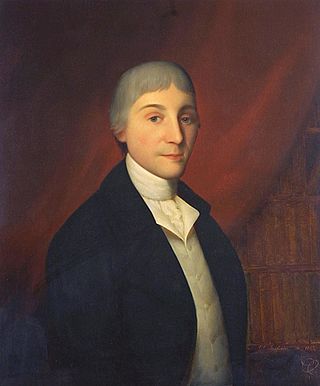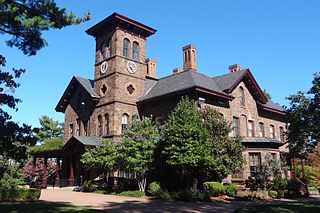
Brown University is a private Ivy League research university in Providence, Rhode Island, United States. It is the seventh-oldest institution of higher education in the US, founded in 1764 as the College in the English Colony of Rhode Island and Providence Plantations. One of nine colonial colleges chartered before the American Revolution, it was the first US college to codify that admission and instruction of students was to be equal regardless of the religious affiliation of students.

Hopewell is a borough in Mercer County, in the U.S. state of New Jersey. Centrally located within the Raritan Valley region, this historical settlement is an exurban commuter suburb of New York City in the New York metropolitan area as defined by the United States Census Bureau. As of the 2020 United States census, the borough's population was 1,918, a decrease of 4 (−0.2%) from the 2010 census count of 1,922, which in turn had reflected a decline of 113 (−5.6%) from the 2,035 counted at the 2000 census.

The First Baptist Meetinghouse, also known as the First Baptist Church in America is the oldest Baptist church congregation in the United States. The Church was founded in 1638 by Roger Williams in Providence, Rhode Island. The present church building was erected between 1774 and 1775 and held its first meetings in May 1775. It is located at 75 North Main Street in Providence's College Hill neighborhood. It was designated a National Historic Landmark in 1960. It is affiliated with the American Baptist Churches USA.

James Manning was an American Baptist minister, educator and legislator from Providence, Rhode Island. He was the first president of Brown University and one of its most involved founders, and served as minister of the First Baptist Church in America.

Dr. Solomon Drowne was a prominent American physician, academic and surgeon during the American Revolution and in the history of the fledgling United States.

University Hall is the first and oldest building on the campus of Brown University in Providence, Rhode Island. Built in 1770, the building is one of only seven extant college buildings built prior to the American Revolution. According to architectural historian Bryant F. Tolles Jr., the structure is "one of the genuine icons of early American collegiate architecture."

The President's House, also known as the John Maclean House, or simply the Maclean House, in Princeton, Mercer County, New Jersey, United States, was built to serve as the home of the President of the College of New Jersey, which later became Princeton University. It was completed in 1756, the same year as Nassau Hall. United States Founding Father John Witherspoon lived here from 1768 through 1779, during which time he served as a delegate to the Continental Congress and signed the Declaration of Independence. George Washington occupied Maclean House in January 1777, during the Battle of Princeton and in 1783 while Congress met in Nassau Hall.

The history of Brown University spans 260 years. Founded in 1764 as the College in the English Colony of Rhode Island and Providence Plantations, Brown is the seventh-oldest institution of higher education in the United States and the third-oldest institution of higher education in New England. At its foundation, the university was the first in the U.S. to accept students regardless of their religious affiliation. Brown's medical program is the third-oldest in New England while its engineering program is the oldest in the Ivy League.

Jonathan Maxcy was an American Baptist minister and college president. He was the second president of Brown University, of which he was also a graduate; the third president of Union College; and the first president of the University of South Carolina.

The Lambertville Historic District is a 198-acre (80 ha) historic district encompassing the community centered around the intersection of Route 29 and Route 179 in the city of Lambertville in Hunterdon County, New Jersey, United States. The district was added to the National Register of Historic Places on June 30, 1983, for its significance in architecture, commerce, industry, and settlement. It includes 680 contributing buildings, and two contributing structures.

The Levi D. Jarrard House is a historic building located on the Douglass College campus of Rutgers University in New Brunswick, New Jersey. It was constructed in 1868 by an unknown architect, as a private residence for Levi D. Jarrard. Levi D Jarrard, was acting as Postmaster of New Brunswick from 1881-1883, but was previously employed as a New Jersey State Senator as well as the Middlesex County Collector. In 1883 he was found to have embezzled approximately $20,000, and had fled to Canada with the funds, leaving his family to struggle with payments on the house. The house was then purchased by John N. Carpender, who would later lease it to the New Jersey College for Women.

Harbourton is an unincorporated community located within Hopewell Township in Mercer County, in the U.S. state of New Jersey. It is located along County Route 579 at the intersection with Harbourton-Mount Airy Road. The Harbourton Historic District, encompassing the community, was listed on the state and national registers of historic places in 1974.

The John D. Hart House is a historic home built c. 1800 and located at 54 East Curlis Avenue in Hopewell Township near the borough of Pennington in Mercer County, New Jersey. It was documented by the Historic American Buildings Survey in 1937. The house was added to the National Register of Historic Places on October 18, 1972, for its significance in architecture.

The John Welling House is a historic Dutch Colonial home in Pennington, New Jersey that dates to the early 18th century. John Welling moved to the Hopewell valley from Jamaica, New York in 1727 and leased the home and 223 acres (90 ha) farm from Terit Lester, purchasing it the next year. A tradition exists that during the British occupation of Pennington during the American Revolution a Hessian soldier was taken captive in the home. Welling's great-granddaughter, Elizabeth Welling, married John D. Hart who built the adjacent John D. Hart House, which is also on the National Register of Historic Places (NRHP). The home remained in the Welling family until 1921 and from 1928 until 1973 was home to Congressman Charles R. Howell. The house is a rare example of a Dutch clapboard and shingle house, one of the few remaining in Mercer County. It was documented by the Historic American Buildings Survey (HABS) in 1937 and was added to the NRHP on March 14, 1973, for its significance in architecture.
James Quayle Dealey was a British American sociologist, journalist, academic, and newspaper editor. Dealey served as the tenth president of the American Sociological Association.

The Joseph Stout House, also known as the Hunt House and the Weart–Hunt House, is a historic stone house built in 1752 and located on Province Line Road in the Stoutsburg section of Hopewell Township in Mercer County, New Jersey, United States. It was documented by the Historic American Buildings Survey (HABS) in 1937. The house was added to the National Register of Historic Places on October 29, 1974, for its significance in military and religion history.

The Old School Baptist Church, historically known as the First Baptist Church of Hopewell, is located at 46 West Broad Street in the borough of Hopewell in Mercer County, New Jersey, United States. The red brick church was built in 1822 and was documented by the Historic American Buildings Survey (HABS) in 1936.. The adjoining Old School Baptist Cemetery was established in 1747. The church and cemetery were listed as part of the Old School Baptist Church and Cemetery of Hopewell historic district in the National Register of Historic Places on November 25, 2024, for their significance in art and architecture. The 4-acre (1.6 ha) district includes one contributing building, one contributing site, one contributing structure, and three contributing objects.
Reverend Isaac Eaton (1724–1772) was a minister and educator from the Hopewell section of Hopewell Township, at the time part of Hunterdon County, now Mercer County, New Jersey, United States. He was the first minister of the Hopewell Baptist Church, also known as the Old School Baptist Church, serving from 1748 until his death in 1772. In 1756, he founded the Hopewell Academy, the first Baptist Latin grammar school in the American colonies. Graduate James Manning became the first president of Brown University.




















